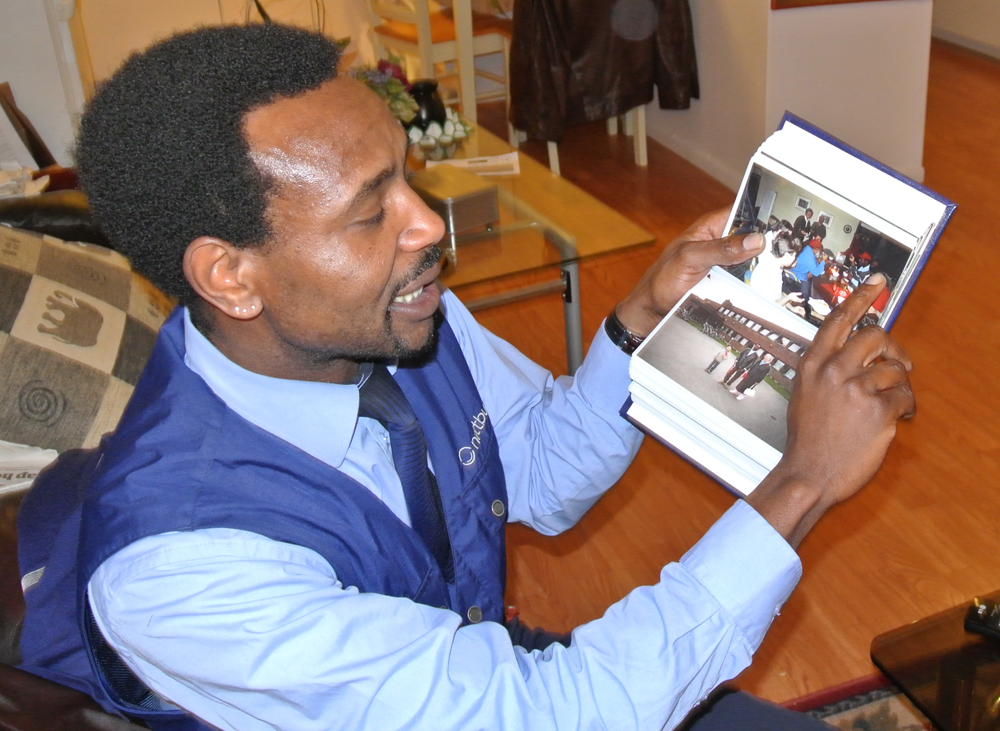A SEAL Team 6 operation targeting a seaside compound in Somalia may have ended in failure but it also cemented a jihadist's position as one of America's most-wanted terrorists.
Abdukadir Mohamed Abdukadir, who is known as Ikrima, is thought to be a key player behind the siege at Kenya's Westgate Mall that claimed dozens of lives in September. Intelligence officials say Ikrima is a commander and active recruiter within the Somali militant group al Shabaab.
He is believed to be associated with those who planned the 1998 U.S. Embassy bombing in Kenya that killed more than 200 people. Ikrima is also suspected of involvement in attacks targeting a hotel and airliner in Mombasa, Kenya, in 2002.
Ikrima was spotted by SEALs through the windows of his heavily fortified compound during last month's raid but the Americans were outnumbered and forced to withdraw. He remains at large.
But in addition to his suspected roles in a series of deadly terrorist acts, experts say there is another key reason why the U.S. was prepared to send members of the same SEAL unit that raided Osama bin Laden’s compound after Ikrima: He appears to be a "point person" between several al Qaeda-linked organizations that have targeted Americans.
Ikrima’s international links -- potentially stretching beyond Africa from Europe to Yemen to Pakistan -- make him deeply worrying to American intelligence officials.
Michael Leiter, a former director of the National Counterterrorism Center who is now an NBC News analyst, said Ikrima's knowledge of al Shabaab's "plotting, modus operandi and leadership intentions" made him attractive to the intelligence services.
"Ikrima is assessed to be central to much of al Shabaab's most current and aggressive planning of attacks in Somalia, Kenya, and potentially beyond," Leiter said. "This, combined with his strong ties to other al Shabaab leadership, make him an ideal target for capture."
Ikrima, 28, grew up in Kenya and speaks several languages -- including English, Somali, Swahili, French, Norwegian and some Arabic.
He is well-connected with al Hijra, a Kenyan militant organization closely linked to al Shabaab, as well as an al Qaeda group behind a plot to blow up a U.S-bound jet by using a bomb in its cargo hold.
"Ikrima has strong connections with al Qaeda in the Arabian Peninsula. He's been to Yemen," al Shabaab expert Stig Jarle Hansen told NBC News. "He overlaps between the two organizations and is most likely part of both, a kind of point person. So he would be crucial in any terror operation. He's a very dangerous person. The Americans have every reason to be worried about him."
Hansen, who is author of "Al Shabaab in Somalia," said Ikrima's "prominence in the al Shabaab and the al Qaeda hierarchy makes it very likely" that he was involved in the Westgate Mall attack but added "we cannot say 100 percent for sure."
Kenyan intelligence officials believe he also may have connections with al Qaeda in Pakistan. And he has also spent time living in Europe.
Ikrima came to Norway in 2004 "and left in a hurry in 2008," according to Norwegian TV2 correspondent Bent Skjaerstad -- who has spent more than a year investigating Ikrima.
It was there that Hamisi Mbombe befriended Ikrima after they met at the Ringsaker Refugee Center, which is located in a town about two hours north of Oslo.
 NBC
NBC
Hamisi Mbombe, a bus driver in the Norwegian town of Brummundal, was among a group of asylum seekers who became friends of Ikrima between 2004 and late 2007. Ikrima was always reluctant to be photographed, Mbombe recalls.
"He was paranoid already when he arrived in 2004," the Congolese-born bus driver recalled. "He was always asking refugees if they had spoken to anyone outside and when they came back to the center was always asking if they'd spoken to the police. He thought everyone was a spy, that everyone at the center was spying on him. Whenever we took a photo at a get-together he always ducked from the camera."
Mbombe, who is now 33, worked alongside Ikrima cleaning offices.
"He had two sides, he was literally two-faced," Mbombe said. "All smiles and pleasant to the boss, quite charming when he was was outside, but back in the center he was unfriendly and aggressive. He spoke a lot about Norway and the Norwegians, saying he hated them and the Americans."
Ikrima, who is a Kenyan citizen of Somali background, was known to ask other refugees at the center if they were Muslim.
"If they said, 'no,' he would call them 'Satan'," Mbombe recalled. "And he also accused the others of buying food from the Israelis when they went grocery shopping downtown."
According to Mbombe, Ikrima spoke English so well that acquaintances thought "he must have spent time in the U.S. or the U.K."
"He was clearly an extremely clever, intelligent guy," Mbombe added.
Mbombe said he hadn't seen his former friend since around late 2007 or early 2008.
 AFP Surveillance footage shows one of the gunmen who massacred at least 67 people at Kenya's Westgate mall on September 21, 2013. Norwegian citizen Hassan Abdi Dhuhulow is suspected of helping to plan and carry out the attack on the upmarket Westgate mall. Dhuhulow was born in Somalia, but he and his family moved to Norway as refugees in 1999, according to relatives who spoke to the BBC.
AFP Surveillance footage shows one of the gunmen who massacred at least 67 people at Kenya's Westgate mall on September 21, 2013. Norwegian citizen Hassan Abdi Dhuhulow is suspected of helping to plan and carry out the attack on the upmarket Westgate mall. Dhuhulow was born in Somalia, but he and his family moved to Norway as refugees in 1999, according to relatives who spoke to the BBC.However, the recent Westgate Mall attack has raised more questions about his time in Norway.
Could he have recruited Hassan Dhuhulow, the 23-year-old Norwegian who appears to be one of the gunmen caught on surveillance cameras during the siege?
Marie Benedicte Bjoernland, the head of the Norwegian Police Security Service, told NBC News that investigators weren't yet able to confirm Dhuhulow's involvement in the massacre.
"We suspect it's a Norwegian citizen," she said. "And if it is this man, we had him in our sights and did quite extensive preventative work with him to try and talk him out of his plan to leave Norway."
Ikrima expert Skjaerstad said the jihadist provided an example of how the terrorism world was shrinking.
"There used to be this clear definition between the different terrorist groups and was quite easy to separate them," the Norwegian journalist said. "But now they are all melting together and it's increasingly difficult for the intelligence services."
No comments:
Post a Comment